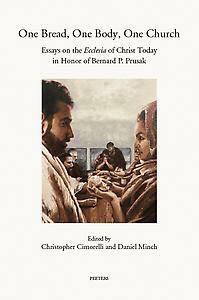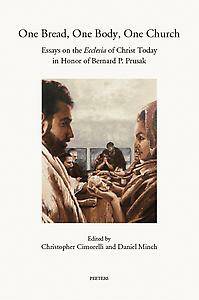
- Retrait gratuit dans votre magasin Club
- 7.000.000 titres dans notre catalogue
- Payer en toute sécurité
- Toujours un magasin près de chez vous
- Retrait gratuit dans votre magasin Club
- 7.000.0000 titres dans notre catalogue
- Payer en toute sécurité
- Toujours un magasin près de chez vous
One Bread, One Body, One Church
Essays on the Ecclesia of Christ Today in Honor of Bernard P. Prusak
69,00 €
+ 138 points
Description
How does the church come from Jesus? Previously, this was a much clearer and more settled question. It could be answered from dogmatic conclusions, rather than from historical investigation. Since the methodological revolutions in Catholic theology of the twentieth century that initiated hermeneutical processes of self-discovery, potential answers to this question are far less stable and comprehensive. The recovery of past elements of tradition and the uncertainty of the future demand creative answers to the challenges facing the church regarding its identity. This volume, prepared in honor of Bernard P. Prusak, attempts to constructively explore the question of 'how' the church comes from Jesus. The contributors have provided critical reflections from different theological disciplines in order to think this question anew from a more 'synoptic' perspective in line with Prusak's own theology. His work consistently plumbs the depths of Christian history and traditions, alive to the liturgical and sacramental life of the Body of Christ, to address the concerns of Christians seeking understanding of their faith today. This volume is comprised of fifteen chapters across two parts, including contributions from four generations of theologians associated with Prusak and his theology. Part I investigates the identity of the church and what it means to encounter God's revelation in history. It features contributions from biblical, liturgical, and systematic theologians on topics ranging from scriptural metaphors to receptions of the Second Vatican Council. Part II seeks to apply critically the principles of faith to the morally complex, ever-changing contemporary world. Contributions here explore systematic considerations of Prusak's ecclesiology in dialogue with Pope Francis's concept of mercy, the role of women in the church, ecclesial power structures, grace, and the future of the 'church unfinished'.
Spécifications
Parties prenantes
- Editeur:
Contenu
- Nombre de pages :
- 319
- Langue:
- Anglais
- Collection :
- Tome:
- n° 81
Caractéristiques
- EAN:
- 9789042944848
- Date de parution :
- 13-04-21
- Format:
- Livre broché
- Format numérique:
- Trade paperback (VS)
- Dimensions :
- 160 mm x 240 mm
- Poids :
- 36 g

Les avis
Nous publions uniquement les avis qui respectent les conditions requises. Consultez nos conditions pour les avis.





